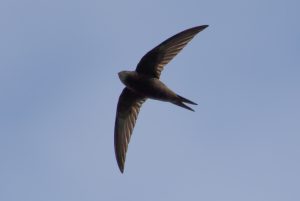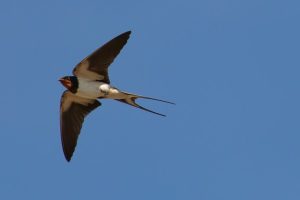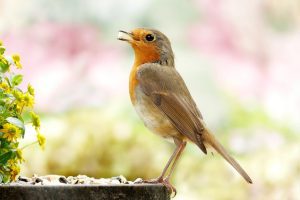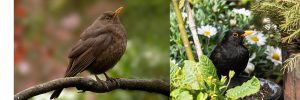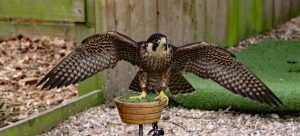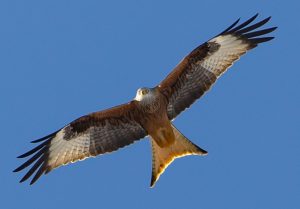Swifts and swallows are as much a part of summer as butterflies and sunflowers. But do you know how to identify them? Here’s a quick guide to these and a few other easily identifiable birds to look out for this summer.
Two summer vacationers
Swifts
High in the sky on a warm day, swifts seem to float through the air. They are the very epitome of an idyllic British summer. When you think they have flown from sub-Saharan Africa, it’s amazing they have the energy left to be so graceful above us.
What to look for: They are relatively small birds with bullet shaped heads, forked tails, and charcoal bodies. Look up to sky for these high fliers, where their crescent-shaped wings help them to be the fastest level flying birds in the world.
Swallows
Swallows are delightful birds that, along with martins and swifts, dart about our summer skies from May through until September. The males arrive in the UK first with the females arriving about a week after them. Also known as barn swallows, they are a common sight around farms.
What to look for: The long forked tail, bluish wing feathers, red throat and a white belly all add up to make swallows very recognisable. Flitting about and chasing each other at a lower level than swifts, they look like they’re having a great time together. Think of those iconic pictures of birds congregating on a telephone wire – they’re probably swallows.
Two all-year-round stalwarts
Robins
Associated with Christmas simply because they don’t fly off to warmer climes in the winter, the robin is always with us. It is one of the most easily spotted birds in your garden and it’s been voted Britain’s favourite bird.
What to look out for: In case you’ve never a received a Christmas card, the most notable feature of a robin is its red breast. It’s a small but plucky bird, not easily frightened off, so you should get chance to capture a picture.
Blackbirds
The humble blackbird is one of our most overlooked avian friends. The most common breeding bird in the British Isles, it adapts to any surroundings, from urban backyards to wild woodlands. Its song is probably the birdsong you are most familiar with, although it’s heard less often after July when mating is over.
What to look out for: the key thing to remember is that while Mr. Blackbird is indeed black, Mrs Blackbird is brown. Listen for their song, particularly, for some reason, after the rain.
Two awesome birds of prey
Peregrine Falcon
The swift may be the fastest bird in level flight, but if you’ve ever seen a peregrine falcon swoop (or, more correctly, stoop) for its prey, you won’t be surprised to find out it can reach speeds of over 200mph, beating a swift’s modest 70mph. These magnificent birds of prey, which mate for life, are increasingly seen in urban environments.
What to look out for: The Peregrine Falcon is the largest of the falcons. Blue black feathers on top with a striped underside and recognisable, if you get close enough, by black markings at the sides of its beak that look like a moustache. Look on cliffsides and rocky outcrops or, if you’re in town, high up on cathedrals and churches.
Red Kite
Red kites are from the same family as eagles, buzzards and harriers. After near extinction by the 1930s, they are now flourishing in many areas of the UK thanks to conservation efforts.
What to look out for: the red of a red kite is more a reddish-brown, with black wing tips. It’s wing span is huge, up to 2m, and it has a distinctive forked tail. The tails twists and turns to keep the bird stable in flight and is one of the clues that you are looking at a red kite. Most likely to be spotted around mixed woodlands, they are slowly rediscovering urban environments, where they were once common.
See how many of these easily recognisable birds you can spot while you are out in and about – and enjoy your summertime bird spotting.
Photo credits:
TheOtherKev: https://pixabay.com/users/theotherkev-9436196/
https://pixabay.com/users/oldiefan-740865/
Kevinsphotos https://pixabay.com/users/kevinsphotos-3037209/

